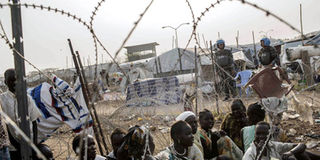Sending refugees to Kenya is an opposition parties' idea

Picture taken on February 24, 2014 shows South Sudanese women waiting in line for food distribution inside the UNMISS compound in the South Sudanese capital, Juba, on February 24, 2014. Danish government does not plan to send refugees from Denmark to Kenya. PHOTO | FABIO BUCCIARELLI |
What you need to know:
- Let me first and foremost emphasise that the Danish government does not plan to send refugees from Denmark to Kenya.
- This is an extraordinary situation which requires massive humanitarian spending to protect and assist refugees around the world, including in Denmark.
- The Danish government is and will continue to be heavily engaged in Kenya and in the Horn of Africa.
On Sunday, October 19 and Thursday October 23, the Nation carried articles about Denmark proposing the establishment of new refugee camps in Kenya.
Let me first and foremost emphasise that the Danish government does not plan to send refugees from Denmark to Kenya. The proposal was put forward by a group of opposition parties as part of a general debate in the country on how to best handle the increasing numbers of refugees that are seeking shelter in Denmark due to ongoing conflicts in, for example, Syria and Iraq.
During the last year, the number of refugees and internally displaced has grown to the highest level since the Second World War — more than 50 million people worldwide.
This is an extraordinary situation which requires massive humanitarian spending to protect and assist refugees around the world, including in Denmark.
Denmark accepts this responsibility as we have done in the past. We have a strong tradition of assisting human beings in need and we are among the top five countries that delivers above the UN goal of 0.7 per cent of GDP for development assistance.
I therefore also strongly disagree with the Danish People Party’s irresponsible proposal to send refugees to camps in Kenya and to link this to continued development assistance. On the contrary, I believe it is essential that Denmark continues to live up to our international responsibilities in a crisis situation like this.
However, we also need to ensure that we do not put our country’s economy at risk when taking our share in helping millions of women, men and children on the run.
The Danish government has therefore decided to temporarily allocate a larger share (DKK2.5 billion, $424 million) of next year’s development aid budget to cover the costs related to receiving refugees and asylum seekers in Denmark.
At the same time, we plan to increase our allocations to humanitarian aid and to continue providing very high levels of support to priority partner countries such as Kenya and Somalia, who themselves are faced with many of the same challenges.
The Danish government is and will continue to be heavily engaged in Kenya and in the Horn of Africa.
During my recent visit to Kenya, I was able to see the progress that was made in a number of our programmes, not least in health and natural resource management that involves Kenyan citizens in decision-making in accordance with the new Constitution and that also brings our countries closer in terms of business and commerce.
Currently, we are planning our support to Kenya for the period 2015-2020. With investments of around DKK1 billion ($200 million), this is our second biggest development partner engagement in the world. We will support the Kenyan government in promoting green growth, good governance and health. On top of that comes additional support for regional security and stability, humanitarian assistance and business cooperation.
We are also preparing our next country programme with Somalia, where we plan to increase our support by 50 per cent in the coming three years.
In November, Denmark will host the High Level Partnership Forum, which is part of international engagement to ensure a nationally-owned process to reconstruct and develop a peaceful Somalia, contributing to long-term stabilisation in the Horn of Africa.
This is another sign of our strong engagement in the region, which we look forward to continue to strengthen.
Mogens Jensen is the Danish Minister for Trade and Development




